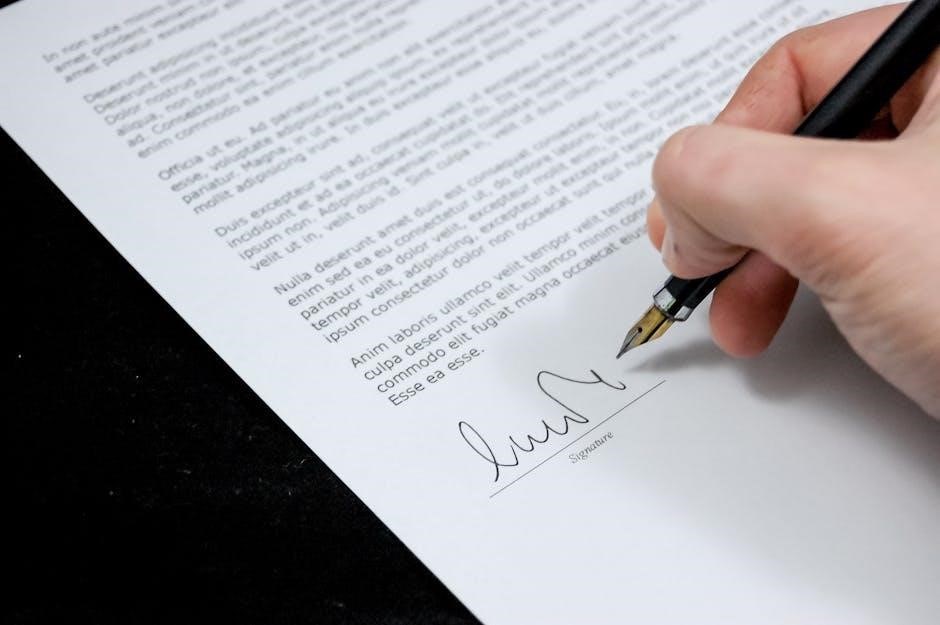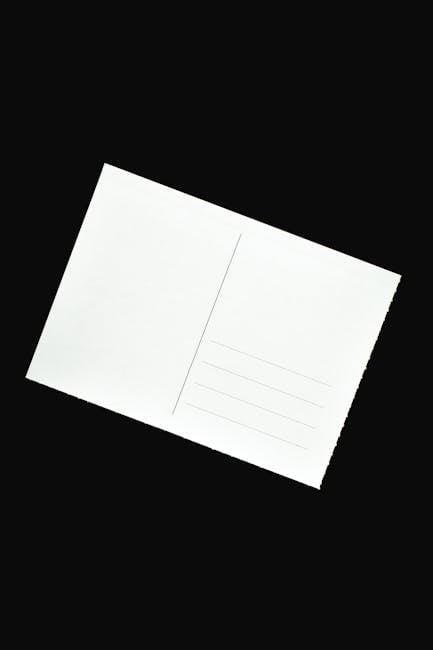
-
By:
- ophelia
- No comment
recommendation letter for nurses pdf
A recommendation letter for nurses is a crucial document showcasing their skills, dedication, and character. It plays a vital role in career advancement, assisting in job positions and academic program applications. This guide provides essential templates and tips for crafting effective recommendation letters.
What is a Recommendation Letter?
A recommendation letter is a formal document written to endorse an individual’s qualifications, skills, and character for a specific opportunity. In the context of nursing, it is typically authored by a supervisor, educator, or colleague who can attest to the nurse’s clinical expertise, professionalism, and interpersonal abilities. The letter highlights the candidate’s relevant experiences, achievements, and personal attributes, providing insight into their suitability for a job position, academic program, or residency. It serves as a credible third-party validation of the nurse’s capabilities and potential, playing a pivotal role in their career advancement. A well-crafted recommendation letter ensures the candidate stands out, demonstrating their readiness for new challenges in the healthcare field.
Importance of a Recommendation Letter for Nurses
A recommendation letter is a vital tool for nurses seeking to advance their careers, as it provides a credible endorsement of their skills, experiences, and character. It bridges the gap between a resume and real-life performance, offering insight into a nurse’s clinical expertise, interpersonal skills, and professionalism. Employers and academic programs rely on these letters to assess a candidate’s fit for a role or program. For nurses, who work in high-stakes environments, a strong recommendation letter can highlight their ability to deliver quality care, work collaboratively, and adapt to challenging situations. It also underscores their commitment to patient-centered care and continuous professional growth. A well-written letter can significantly enhance a nurse’s chances of securing a desired position or admission, making it an essential component of their career development.

Structure of a Recommendation Letter
A recommendation letter typically includes a header, salutation, introduction, body paragraphs highlighting qualifications and experiences, and a closing with a signature. It is concise and professionally formatted.
Header and Contact Information
The header of a recommendation letter for nurses should include the writer’s full name, professional title, institution or place of employment, and contact details such as email and phone number. This information is placed at the top of the page, typically aligned to the left or centered. Including the date is also standard practice, positioned below the contact information. A professional header ensures the letter is easily identifiable and adds credibility to the recommendation. Proper formatting is essential to maintain a formal tone, making it clear and accessible for the recipient to reach out if needed. This section sets the tone for the rest of the letter, emphasizing the writer’s authority and relationship with the candidate. It is crucial to present this information clearly and concisely to avoid any confusion.
Salutation and Greeting
The salutation and greeting of a recommendation letter for nurses set the tone for the entire document. It is important to address the recipient formally, such as “Dear Hiring Manager” or “To Whom It May Concern,” depending on the specific context. The greeting should be polite and professional, reflecting the seriousness of the recommendation. For letters with a specific recipient, addressing them by name is ideal, as it adds a personal touch and demonstrates familiarity. The salutation is followed by a brief introduction that outlines the purpose of the letter and the writer’s relationship with the nurse being recommended. This section is crucial for establishing credibility and ensuring the letter is taken seriously by the recipient. Proper formatting and tone are essential to maintain professionalism and clarity from the outset.
Body of the Letter

The body of the recommendation letter for nurses is where the writer provides detailed information about the candidate’s qualifications, skills, and experiences. This section should highlight the nurse’s clinical expertise, interpersonal skills, and dedication to patient care. It is important to include specific examples or anecdotes that illustrate the nurse’s abilities, such as successfully managing complex patient cases or demonstrating exceptional teamwork. The writer should also emphasize the candidate’s personal qualities, such as empathy, professionalism, and work ethic, to paint a comprehensive picture of their suitability for the position or program. The tone should remain professional and objective, with a focus on measurable achievements and observable traits. By providing concrete details, the letter strengthens the nurse’s application and reinforces their credibility as a qualified candidate.

Closing and Signature
The closing and signature section of a recommendation letter for nurses is the final opportunity to reinforce the candidate’s strengths and leave a lasting impression. It typically begins with a polite closing statement, such as “Sincerely” or “Best regards,” followed by the writer’s full name, job title, institution, and contact information. The signature should be professional and legible, ensuring the letter’s authenticity. Including a sentence offering to provide additional information or answer questions adds a courteous touch. This section should be concise, maintaining a respectful and professional tone throughout. Proper formatting and accuracy in the contact details are essential to ensure the letter’s credibility and ease of follow-up. A well-crafted closing and signature complete the letter, leaving the reader with a positive and enduring impression of the candidate.

Key Content Elements
A strong recommendation letter for nurses should highlight the candidate’s qualifications, clinical experience, and personal qualities, providing specific examples to demonstrate their skills and character effectively.
Candidate’s Qualifications and Skills
A recommendation letter for nurses should emphasize the candidate’s qualifications and skills, such as their education, certifications, and clinical expertise. Highlighting their ability to provide compassionate care, communicate effectively, and work collaboratively is essential. Specific examples, like proficiency in medical procedures or leadership in team settings, demonstrate their competence. Additionally, mentioning soft skills such as empathy, adaptability, and problem-solving abilities can strengthen the letter. It’s important to tailored the content to the candidate’s strengths and the position they’re applying for, ensuring the letter is personalized and impactful. By focusing on both technical and interpersonal skills, the letter provides a well-rounded view of the nurse’s capabilities, making it a credible and persuasive endorsement.
Clinical Experience and Achievements
Highlighting a nurse’s clinical experience and achievements is crucial in a recommendation letter. Detail their hands-on patient care experience, noting specific roles and responsibilities. Mention any notable achievements, such as successful patient outcomes or innovative practices they’ve implemented. Quantifiable accomplishments, like reducing infection rates or improving patient satisfaction scores, add credibility; Additionally, include any leadership roles or mentorship they’ve provided to junior staff. Emphasize their ability to work under pressure and adapt to challenging situations. By showcasing both their professional growth and dedication to excellence, the letter underscores their value as a skilled and compassionate caregiver. This section should provide concrete examples that illustrate their impact in clinical settings, reinforcing their qualifications for the position or program they’re applying to.

Personal Qualities and Work Ethic
In a recommendation letter for nurses, highlighting personal qualities and work ethic is essential to portray the candidate’s character and reliability. Emphasize traits like compassion, empathy, and a patient-centered approach, which are vital in nursing. Mention their ability to remain calm under pressure and their commitment to delivering high-quality care. Highlight their professionalism, punctuality, and dedication to continuous learning. If applicable, note their leadership skills and ability to collaborate with healthcare teams. Discuss their integrity, honesty, and strong moral compass, which are critical in building trust with patients and colleagues. Additionally, include any examples of their willingness to go above and beyond, such as volunteering for challenging cases or mentoring new staff. These personal attributes and a strong work ethic make the nurse an invaluable asset to any healthcare organization.

Writing Tips for a Strong Recommendation Letter
Crafting a strong recommendation letter requires being concise, using specific examples, maintaining a professional tone, and proofreading for errors to ensure clarity and effectiveness.

Be Concise and Focused
When writing a recommendation letter for nurses, it is essential to be concise and focused. Aim for clarity and precision, avoiding unnecessary details that do not highlight the candidate’s strengths. Keep the letter between one to two pages, ensuring each paragraph serves a purpose. Begin with a strong introduction stating your relationship with the candidate, then focus on their qualifications, skills, and achievements. Avoid generic statements by providing specific examples that demonstrate their expertise and character. Tailor the letter to the position or program they are applying for, emphasizing relevant experiences. Remember, the goal is to present a clear, compelling portrait of the candidate while maintaining professionalism and brevity. This approach ensures the letter is impactful and easy to read for the recipient.
Use Specific Examples and Anecdotes
Incorporating specific examples and anecdotes into a recommendation letter for nurses makes it more engaging and credible. Instead of general statements like “she is a skilled nurse,” provide details such as “she successfully managed a high-acuity unit, improving patient outcomes by 20%.” Share stories that highlight their leadership, compassion, or problem-solving skills. For example, describe a time they went above and beyond to comfort a patient or led a team through a challenging situation. These concrete examples help the recipient understand the candidate’s capabilities and character better. Personalizing the letter with real-life scenarios makes the recommendation more authentic and memorable. Use these examples to demonstrate how the nurse has made a positive impact in their previous roles, ensuring the letter stands out and supports their application effectively.
Maintain Professional Tone and Language
Maintaining a professional tone and language is essential when writing a recommendation letter for nurses. The letter should reflect respect, clarity, and formality, ensuring it is suitable for academic or employment purposes. Avoid using slang, overly casual phrases, or jargon that may not be universally understood. Instead, use clear and concise language that effectively communicates the candidate’s qualifications and strengths. Ensure the letter is well-structured, with proper grammar and punctuation, as this reflects the writer’s professionalism and attention to detail. A polished and professional tone enhances the credibility of the recommendation, making it more impactful for the recipient. By adhering to these guidelines, the letter will serve as a strong endorsement of the nurse’s skills and character, supporting their application effectively.
Proofread for Errors
Proofreading is a critical step in crafting a strong recommendation letter for nurses. Even minor errors in spelling, grammar, or punctuation can undermine the professionalism of the letter and the credibility of the writer. Carefully review the document to ensure clarity and accuracy, checking for any typos or formatting issues. Reading the letter aloud can help identify awkward phrasing or unclear sentences. Additionally, verify that all contact information and details about the candidate are correct. A well-proofread letter demonstrates attention to detail and respect for the recipient, enhancing the overall impact of the recommendation. Ensuring error-free writing is essential for maintaining a professional tone and effectively advocating for the nurse’s qualifications and potential.

Templates and Samples
Explore a variety of free nursing recommendation letter templates and PDF samples online. These resources offer customizable formats tailored for different purposes, ensuring professional and polished recommendations for nurses.
Free Nursing Recommendation Letter Templates
Utilizing free nursing recommendation letter templates can streamline the process of creating a polished document. These templates are designed to highlight the candidate’s qualifications and skills effectively. They often include sections for the candidate’s name, position, and achievements, making it easy to customize. Many websites offer downloadable templates in Word or PDF formats, allowing users to edit them according to their needs. These templates ensure that the recommendation letter meets professional standards, helping the candidate stand out in their job or academic applications. By using a template, the writer can focus on the content, ensuring that the letter is both concise and impactful. This approach saves time while maintaining the quality of the recommendation.
PDF Samples for Reference
PDF samples of nursing recommendation letters provide valuable references for crafting professional documents. These samples are readily available online and offer insights into proper formatting, structure, and content. They often include placeholders for personal details, making it easier to customize them for specific candidates. Many samples highlight key sections such as the candidate’s qualifications, clinical experience, and personal qualities. Using these PDF samples ensures that the recommendation letter adheres to professional standards and effectively showcases the nurse’s skills. They also serve as a guide for maintaining a clear and concise tone, which is essential for making a strong impression. By reviewing these samples, writers can gain a better understanding of what to include and how to present the information effectively.
Customizable Templates for Different Purposes
Customizable templates for recommendation letters offer flexibility and ease of use, allowing writers to tailor the content to specific needs. These templates are designed to accommodate various scenarios, such as job applications, academic programs, or residency positions. Many templates feature drag-and-drop functionality, enabling users to edit sections like candidate qualifications, clinical experience, and personal qualities effortlessly. They often include placeholders for names, dates, and contact information, making the customization process straightforward. Additionally, some templates are specifically tailored for nurses, ensuring the language and structure align with industry standards. By using these templates, writers can ensure their recommendation letters are professional, well-organized, and relevant to the intended purpose. This adaptability makes customizable templates an invaluable resource for crafting compelling and effective recommendation letters for nurses.
A well-crafted recommendation letter is essential for nurses seeking career advancement. Utilize available templates and resources to create impactful letters that highlight skills, dedication, and professionalism effectively.
Final Thoughts on Crafting an Effective Recommendation Letter

Crafting a strong recommendation letter for nurses requires careful attention to detail, personal insights, and a professional tone. Begin by clearly stating your relationship with the candidate and their qualifications. Highlight specific examples of their clinical skills, dedication, and teamwork to make the letter compelling. Avoid generic statements and ensure the letter is concise, focused, and free of errors. Use professional language throughout and personalize the content to reflect the nurse’s unique strengths. Finally, proofread the letter thoroughly to ensure clarity and professionalism. By following these guidelines, you can create a recommendation letter that effectively showcases the nurse’s capabilities and supports their career goals.
Encouragement to Use Available Resources
Utilizing available resources can significantly enhance the quality of your recommendation letter for nurses. Free templates and samples provide a solid foundation, ensuring your letter is structured professionally. Websites offer customizable templates that cater to specific needs, such as academic programs or job applications. These resources not only save time but also guide you in highlighting the candidate’s strengths effectively. Additionally, PDF samples offer examples of well-crafted letters, helping you avoid common pitfalls. By leveraging these tools, you can create a polished and impactful recommendation letter that stands out. Explore online platforms and download templates to streamline your writing process and ensure the nurse’s qualifications shine through.